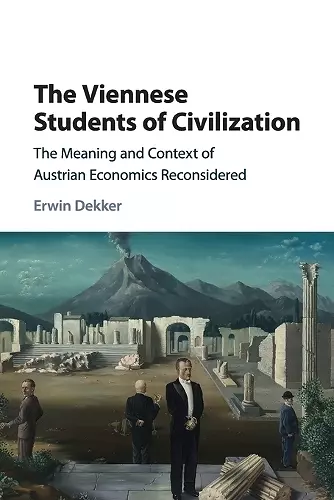The Viennese Students of Civilization
The Meaning and Context of Austrian Economics Reconsidered
Format:Paperback
Publisher:Cambridge University Press
Published:16th May '19
Currently unavailable, and unfortunately no date known when it will be back
This paperback is available in another edition too:
- Hardback£100.00(9781107126404)

A fresh look at Austrian economists and the dynamic intellectual and political context in which they lived and worked.
This book argues that the work of the Austrian economists, including Carl Menger, Joseph Schumpeter, Ludwig von Mises and Friedrich Hayek, has been narrowly interpreted. Through a study of Viennese politics and culture, it is demonstrated that the project they were engaged in was much broader: the study of civilization.This book argues that the work of the Austrian economists, including Carl Menger, Joseph Schumpeter, Ludwig von Mises and Friedrich Hayek, has been too narrowly interpreted. Through a study of Viennese politics and culture, it demonstrates that the project they were engaged in was much broader: the study and defense of a liberal civilization. Erwin Dekker shows the importance of the civilization in their work and how they conceptualized their own responsibilities toward that civilization, which was attacked left and right during the interwar period. Dekker argues that what differentiates their position is that they thought of themselves primarily as students of that civilization rather than as social scientists, or engineers. This unique focus and approach is related to the Viennese setting of the circles, which constitute the heart of Viennese intellectual life in the interwar period.
'… a brilliant exploration of the historical, scientific, philosophical and cultural context of the Austrian School of economics … Any reader fascinated by intellectual history and the play between idealizations and circumstances will find Dekker's approach very illuminating.' Peter Boettke, George Mason University, Virginia
'Erwin Dekker's thoughtful book firmly situates the so-called 'Austrian School' of economics within its Viennese background, showing its members can be better thought of as students of civilization than as disciplinary economists … The Viennese Students of Civilization is to be welcomed as an important contribution to twentieth-century intellectual economic history and current political thought.' Haaro Mass, Université de Lausanne, Switzerland
'In this thoughtful account of interwar Vienna and the Austrian tradition, Erwin Dekker reveals a humanistic scholarly sensibility quite rare amongst historians of economics. He adroitly interweaves the exploration of economics, sensibility and culture, yielding a book that will appeal to a correspondingly broad readership.' Robert Leonard, Université du Québec à Montréal
'Dekker's volume opens up many interesting historiographic questions and suggests many compelling research paths. By arguing that even the logical-deductive theorists of the Austrian School shared many insights in the development of society and the political role of economists, the book proves to be an effective manifesto in favour of studying economics and economic thought from a cultural point of view. It thus constitutes a useful reading for students in economics and history.' Monika Poettinger, History of Economic Ideas
'Dekker, currently an assistant professor of cultural economics at Rotterdam, is well aware of the challenge presented by the wealth of literature, and also of the multiple challenges presented by the 150 years of the Austrian School's history … And he handles the challenges elegantly and successfully. … Dekker provides numerous highly innovative interpretations about several Austrian economists as well as about the tradition as a whole - and often does so provocatively, which makes his story refreshing and energizing. … he offers a volume which is equally well readable for a historian of economics, for an economist curious to learn more about the 'Austrians', and for the interested layman. … he not only supplies insightful fragments of historical value, but also an overarching narrative which is highly relevant for our age's economy and society with their recent symptoms of instability and fragility.' Stefan Kolev, ORDO
'Dekker provides an insightful account of Viennese intellectual culture and its role in shaping Austrian Economics during its formative decades. His focus upon local academic networks is a very productive and original approach to this field, and references to contemporary Viennese literature add analytical value to this.' Alexander Ebner, The European Journal of the History of Economic Thought
ISBN: 9781107565661
Dimensions: 229mm x 153mm x 15mm
Weight: 450g
234 pages